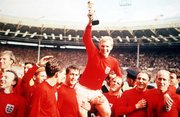1966 World Cup Final
|
|
The 1966 Football World Cup Final was the final match in the Football World Cup 1966, contested by England and West Germany. England defeated West Germany 4-2. The game was played on July 30, 1966 at Wembley Stadium in London, and had an attendance of 93,000.
England, managed by Alf Ramsey and captained by Bobby Moore, won the toss and elected to kick off. After twelve minutes, Held sent a speculative cross into the English penalty area which Ray Wilson misheaded to Helmut Haller, who promptly scored.
In the 19th minutes Overath conceded a free kick, which Bobby Moore floated into the German area, Geoff Hurst ran in and deflected the ball into the net for an equaliser.
The teams were all square at half time, but after 77 minutes Martin Peters found the back of the net to give England the lead. 2-1 to England. However after a period of sustained German pressure, Weber levelled the score from a free kick to 2-2 shortly before full-time.
The match then went into extra time.
With eleven minutes of extra time gone, Geoff Hurst shot from fairly close in and the ball hit the underside of the cross bar, bounces down - apparently near the line - and was cleared. Was it a goal? The definition of a goal is that the whole of the ball has to be over the whole of the line. The referee was uncertain and consulted his linesman, Tofik Bakhramov, who waved his flag. The crowd were bewildered, some arguing that it was a goal and others not. It was a moment of drama watched by 400 million television viewers. The referee awarded the goal.
One minute before the end of play, Alan Ball picked out the unmarked Geoff Hurst with a long pass, which Hurst carried forward to score. The final goal gave rise to one of the most famous sayings in English football. The BBC commentator Kenneth Wolstenholme described the last goal, which happened as a few people mistakenly ran onto the pitch believing that the end of the game had been signalled, as follows:
- "He's got... some people are on the pitch ... they think it's all over ... it is now!"
England's third goal has remained controversial for many years after the match; it is generally recognised to have been the deciding goal, because England's fourth goal was scored after the West Germans had sent their defenders forward in a desperate attempt to score a last-minute equaliser. In 1995, researchers from Oxford University announced the results of computer video analysis of the television footage, which gave new angles of view: they concluded that the shot had not crossed the line, so should have been disallowed. Since the 1966 World Cup Final, controversial goals in Germany are called Wembley-Tor (Wembley goal).
Players and officials
England: Gordon Banks (Goalkeeper), George Cohen, Ray Wilson, Nobby Stiles, Jackie Charlton, Bobby Moore (captain), Roger Hunt, Alan Ball, Bobby Charlton, Geoff Hurst, Martin Peters.
West Germany: Hans Tilkowski (goalkeeper), Horst-Dieter Höttges, Willi Schulz, Wolfgang Weber, Karl-Heinz Schnellinger, Helmut Haller, Franz Beckenbauer, Wolfgang Overath, Uwe Seeler, Siegfried Held, Lothar Emmerich.
The referee was Gottfried Dienst (Switzerland) and the linesmen were Tofik Bakhramov (USSR) and Karol Galba (Czechoslovakia).

